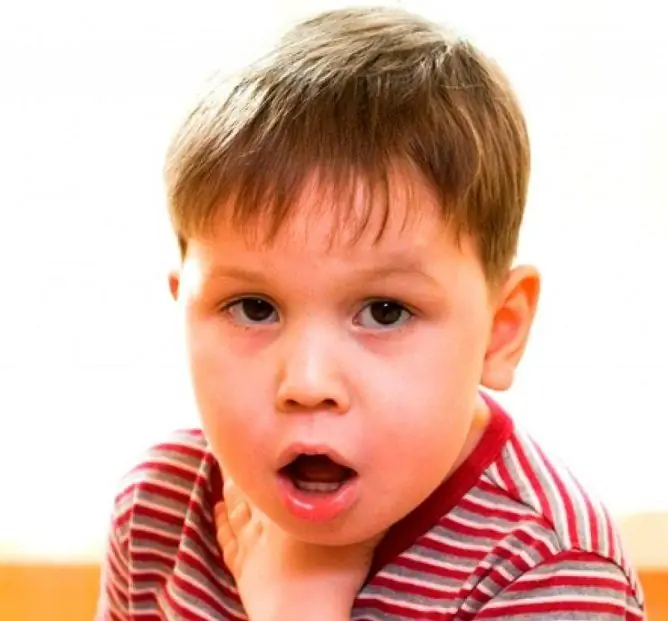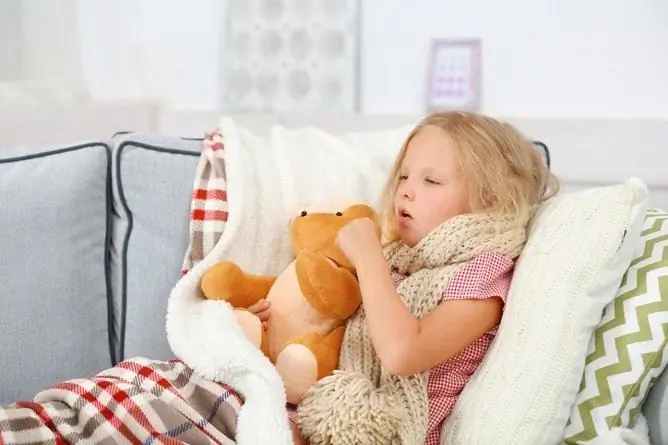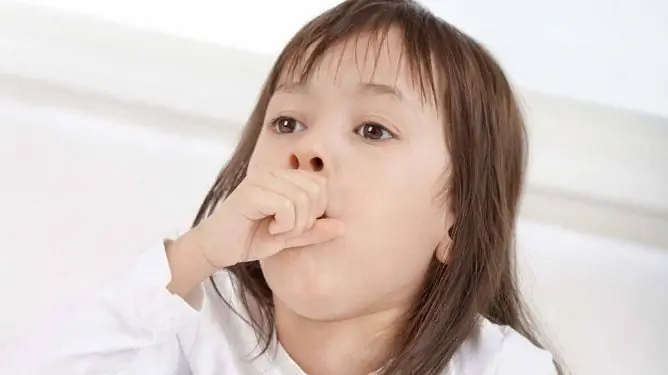Barking cough: how to treat, causes and accompanying symptoms
The content of the article:
-
How to treat a barking cough
- Whooping cough
- Laryngitis
- Tracheitis
- Allergy
- Psychosomatic cough
- Treatment of cough with folk remedies
- The reasons for the development of a barking cough in a person
-
Associated symptoms
- If a foreign body enters the respiratory tract
- Against the background of an allergic reaction
- With tracheitis
- With laryngitis
- With whooping cough
- Video
How to treat a barking cough in adults and children depends on the cause of the development of the pathology, the existing signs, contraindications, the patient's age and a number of other factors. Dry cough can be a reflex reaction of the human body in response to irritation of the mucous membranes of the respiratory tract. It can also develop in certain diseases.

A barking cough requires medical attention, self-medication is unacceptable
To make a diagnosis, you need:
- collection of complaints and anamnesis;
- physical diagnostics;
- laboratory tests;
- X-ray examination;
- computed or magnetic resonance imaging, etc.
The choice of drugs and methods of therapy for barking cough should be carried out by a qualified specialist.
How to treat a barking cough
In some cases, if a patient develops an illness in which this type of cough is observed, hospitalization may be required, since there is a risk of laryngeal edema and asphyxia.
If a foreign body is inhaled, seek immediate medical attention. Removal of the object usually requires bronchoscopy, but surgery may also be necessary.
The use of certain drugs for a barking cough, first of all, depends on the cause of its development. For the treatment of children, drugs in the form of a syrup are most convenient.
With a painful, debilitating, unproductive barking cough and the absence of mucus in the respiratory tract, patients may be prescribed antitussives.
In the presence of an infection, depending on the type of pathogen, the following can be used:
- antibiotics (for bacterial infection);
- antimycotics (if microscopic fungi act as an infectious agent).
Whooping cough
With whooping cough, the patient can be prescribed anti-infectious, antispasmodic, antihistamines, vitamin complexes. Oxygen therapy may be required. Patients are shown a diet aimed at compensating for the loss of nutrients due to vomiting against a background of severe cough.
Laryngitis
In the treatment of laryngitis, it is important to limit the voice mode (the patient should talk less, including it is not recommended to speak in a whisper). The patient may be prescribed antihistamines, inhalations with alkaline solutions, essential oils.
At the time of illness, you need to stop smoking and drinking alcohol. Patients are advised to drink warm, warming compresses, physiotherapy can be used.
Tracheitis
Depending on the available signs for the treatment of tracheitis, the following can be used:
- anti-infective drugs;
- desensitizing drugs;
- mucolytic, expectorant drugs, etc.
Allergy
With an allergic cough, the patient should exclude or minimize contact with the allergen, antihistamines are prescribed. In some cases, non-specific desensitizing therapy is performed.
Psychosomatic cough
With a psychosomatic cough, sedatives, antidepressants may be prescribed, you may need to work with a psychologist, neurologist, psychiatrist.
Treatment of cough with folk remedies
In addition to the main treatment for this type of cough, folk remedies can be used, which are especially effective in the early stages of certain diseases. Their use requires mandatory agreement with a doctor.
- Warm milk with honey and butter. In 1 glass of hot (no more than 60 ° C) milk, dissolve 1 teaspoon of honey and butter. It is recommended to drink the product at night.
- Milk with carrots. Chop (using a grater) 1 small carrot, pour 1 glass of warm milk over it, leave for 30 minutes and strain. The finished product is recommended to be consumed before bedtime.
You can drink tea with lemon, honey or raspberry jam, lingonberry and cranberry teas. Also, as a tea, you can use infusions of chamomile, peppermint, sage, linden flowers, elderberry, thyme, licorice root, elecampane, eucalyptus, rose hips.

Folk remedies for cough should only be used in consultation with a doctor.
The reasons for the development of a barking cough in a person
A paroxysmal dry cough often appears against the background of inflammatory processes in the respiratory tract (most often in the nasopharynx, trachea, bronchi).
Diseases that may be accompanied by this type of cough include pharyngitis, laryngitis, tracheitis, whooping cough (in a child or adult), croup. In some cases, such a cough can occur in the early stages of the development of a malignant neoplasm of the respiratory system.
Also, the occurrence of a barking cough is possible if the patient has an allergic reaction. The table lists some types of seasonal and year-round allergens that can cause an inadequate immune response.
| Seasonal |
Plant pollen Raw vegetables (cucumbers, Swiss chard, celery, etc.) Raw fruits (apricots, melon, watermelon, cherries, peaches, etc.) Some nuts |
| Year-round |
Dust Animal fur Food Medicines |
In addition, the cause may be the ingress of a foreign body into the respiratory tract, inhalation of too dry air, smoking. Also, patients may experience a psychosomatic cough against the background of strong experiences, stressful situations.
Associated symptoms
With a barking cough, the patient may hear whistling sounds on exhalation, and this symptom may also be accompanied by hoarseness, shortness of breath, sore throat, pallor of the skin, headache, lethargy, rapid fatigue, fever, sometimes significant.
If a foreign body enters the respiratory tract
The patient has a severe cough, cyanosis and / or spots on the skin, suffocation may occur. The risk of death from asphyxiation increases with larger objects. Small objects can enter the lower respiratory tract. At the same time, the patient has a paroxysmal cough (it may resemble a whooping cough cough), dissatisfaction with inhalation, and dysphonia.
Against the background of an allergic reaction
The cough is usually dry. In cases where sputum is separated from a patient with an allergic cough, it is scanty, transparent, viscous. In addition to coughing, a person complains of rhinitis, watery eyes, reddening of the sclera of the eyes, sneezing, itching and / or tickling sensation in the nose and throat, and skin rashes.

Allergic cough is accompanied by tearing, nasal discharge, sneezing
With tracheitis
Tracheitis cough is usually worse in the morning. At the initial stage of the pathology, the cough is dry, then sputum begins to separate from the patient.
In addition to coughing, there may be:
- increased body temperature (usually to subfebrile values);
- sore throat and / or chest pain;
- discharge from the nasal cavity;
- nasal congestion;
- weakness, drowsiness.
With laryngitis
With laryngitis, patients complain of a strong dry cough, hoarseness (up to a temporary loss), sore throat. The cough with this disease is dry at first, later when coughing, sputum can be separated.
Also, patients with laryngitis have:
- dry throat;
- pain when swallowing;
- acrocyanosis;
- difficulty breathing;
- headache:
- increased body temperature.
With whooping cough
At the initial stage of the disease, the patient is worried about a dry cough at normal or slightly elevated body temperature. The cough is worse at night. With the progression of the pathological process, coughing attacks can end with a specific whistling sound (reprises), which occurs against the background of narrowing or cramps of the glottis.
During coughing fits with whooping cough, the patient may sputum. Swallowing mucus released during coughing (especially in children) can cause vomiting. When coughing, redness of the skin of the face is observed, in children, the tongue is sometimes injured.
Over time, coughing attacks occur less and less, the frequency of cough tremors decreases. The most severe course of the disease is characteristic of children in the first year of life. During severe coughing in infants, breathing may stop for a few minutes, posing a threat to the child's life.
After whooping cough, the cough may persist for several weeks.
In adult patients, the disease can be complicated by:
- inspiratory shortness of breath (difficulty breathing);
- a decrease in body weight (due to bouts of vomiting, which occurs with a strong cough);
- urinary incontinence;
- apnea;
- loss of consciousness;
- pneumonia;
- inflammation of the middle ear;
- cracks and / or fractures of the ribs (due to a severe, excruciating cough);
- bleeding from the nose and / or ears;
- sleep disorders;
- the development of an umbilical or inguinal hernia.
Complications of whooping cough in children can be short-term respiratory arrest, development of pneumonia, convulsions, cerebral disorders.
Video
We offer for viewing a video on the topic of the article.

Anna Aksenova Medical journalist About the author
Education: 2004-2007 "First Kiev Medical College" specialty "Laboratory Diagnostics".
The information is generalized and provided for informational purposes only. At the first sign of illness, see your doctor. Self-medication is hazardous to health!







